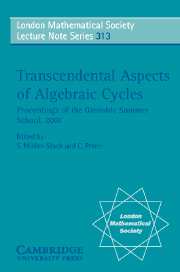5 - A short introduction to higher Chow groups
from Part III - Motives and motivic cohomology
Published online by Cambridge University Press: 07 May 2010
Summary
Introduction
The goal of this text is to give a short (and fast) introduction to the theory of higher Chow groups and related concepts. It is designed as a ‘quick user's guide’ and not at all as a ‘reference manual’. Few proofs are given, instead we try to explain why (and how) the hypotheses of the statements are used, and how to use the theory. In the same way, no historical background and no motivations are given. A complete treatment of the theory of higher Chow groups is beyond the scope of the present text. It is designed primarily for people who just need to know the basics of the constructions and the theory, and some main results. The prerequisites are standard: graduate commutative algebra, algebraic geometry, homological algebra, category theory and (classical) intersection theory. Some knowledge of (algebraic) number theory and algebraic topology could help to understand the theory and several examples. A final word: if you need to quote a result from this paper, please use the original reference instead, in order to avoid misleading ownership.
Conventions, notation and basic definitions Unless specified, in this paper, ring means commutative domain, and mainly noetherian. If R is a ring, 0 and 1 always denote, respectively, its neutral for the laws + and ×. If R is a ring, we will denote by R× its units and if {r0, …, rm} (with m a natural number) is a collection of elements of R, we will denote by (r0, …, rm) the ideal of R spanned by those elements.
- Type
- Chapter
- Information
- Transcendental Aspects of Algebraic CyclesProceedings of the Grenoble Summer School, 2001, pp. 171 - 196Publisher: Cambridge University PressPrint publication year: 2004



